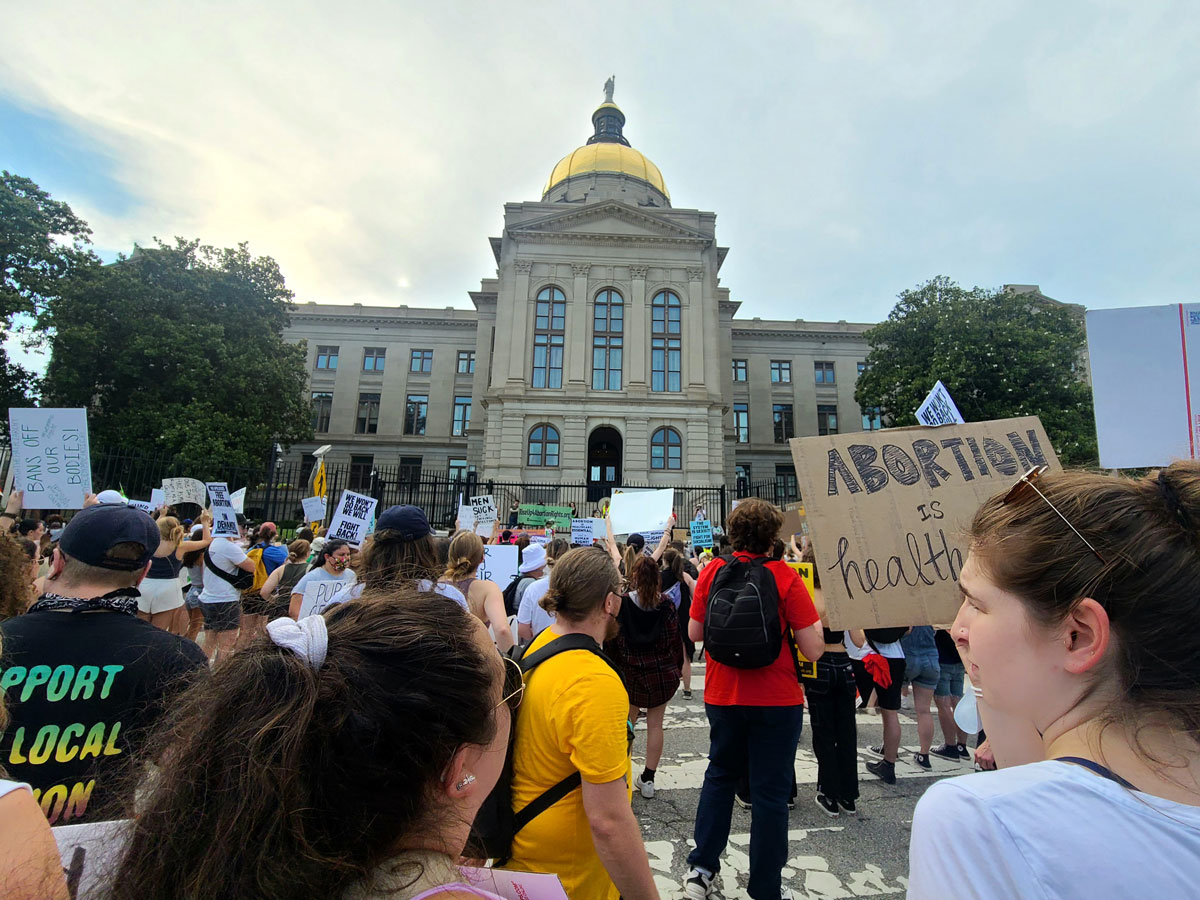
Photograph by Sean Keenan
As the U.S. Supreme Court’s decision to overturn Roe v. Wade shook the nation, threatening access to potentially vital healthcare for millions, hundreds of Atlantans took to the streets Friday evening, braving the sweltering heat and humidity to demand reproductive rights.
The Supreme Court’s decision sent particularly visceral shockwaves through Georgia’s abortion-rights community, as it paves the way for the state’s so-called “heartbeat bill”—a measure passed in 2019 that would ban most abortions after about six weeks of pregnancy—to finally take effect after years of court challenges. Should House Bill 481 ultimately become enforceable, it would put more than 200 miles between the average Georgian and the closest legal abortion provider once the six-week limit is up. (Most people do not know they’re pregnant before six weeks.)
But Atlanta City Councilwoman Liliana Bakhtiari, who this week championed legislation seeking to bar the use of municipal money for enforcement of the state’s anti-abortion laws, still has hope. “While the overturning of Roe v. Wade is absolutely horrific—and I still can’t fully believe it—there has been such a rise in progressive ideology and efforts across the board that I think many conservatives feel backed into a corner,” Bakhtiari said, adding that the ruling will likely galvanize otherwise politically uninvolved citizens to hit the ballot box.
Outside the Georgia capitol, droves of demonstrators chanted pleas for bodily autonomy: “When our lives are under attack, what do we do? Stand up; fight back.”

Photograph by Sean Keenan
After marching through Downtown, the growing crowd paused at Underground Atlanta, clogging Pryor Street for more songs and speeches. Standing in the bed of a pickup truck, Sabel, an organizer with advocacy group Rise Up 4 Abortion Rights, shouted through a megaphone, “We will not allow [the Supreme Court] to tell our girls and women how to control their bodies.”
Friday’s news underscored the longtime ideological fissures between the Georgia statehouse and Atlanta City Hall, with Republican Governor Brian Kemp declaring the ruling a “historic victory for life” and Democratic Mayor Andre Dickens saying he was “sickened by this decision that wrongly and immorally tells women that their bodies are not their own.”

Photograph by Sean Keenan
It also spotlighted how much Georgia could change—or remain the same—after the November election. Democratic gubernatorial candidate Stacey Abrams, for instance, vowed “to defend a woman’s right to choose” and “to ensure access to affordable and safe healthcare for all, including access to abortion.” Democratic attorney general candidate Jen Jordan, who gained widespread recognition after delivering a speech about her own miscarriages as HB 481 was going through the Georgia Legislature, has also said she would challenge anti-abortion laws.
On the other side of the spectrum, Republican U.S. Senate candidate Herschel Walker and lieutenant governor hopeful Burt Jones have advocated for total abortion bans—restrictions without exemptions in cases of rape or incest. (The pending HB 481 has exceptions for rape and incest with a filed police report.)
Despite her optimism, Bakhtiari warned that the court’s ruling could open the floodgates for other legal rollbacks, including challenges to contraceptive access and same-sex marriage rulings. Atlanta leaders, Bakhtiari said, must now band together with neighboring governments and lead the charge to protect the rights of not just women, but the LGBTQ+ community, people of color, and others.
“As tired as we all are,” Bakhtiari said, “we have to recognize that we need to do this.”













